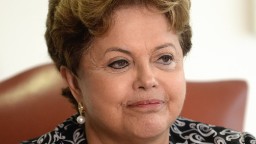
CNN
—
Here’s a look at the life of former Brazilian President Dilma Rousseff.
Birth date: December 14, 1947
Birth place: Belo Horizonte, Minas Gerais, Brazil
Birth name: Dilma Vana Rousseff
Father: Pedro Rousseff, construction entrepreneur
Mother: Dilma Jane (da Silva) Rousseff, teacher
Marriages: Carlos Araujo (1973-2000, divorced); Claudio Galeno Linhares (1968-early 1970s, divorced)
Children: with Carlos Araujo: Paula, 1976
Education: Federal University of Rio Grande do Sul, B.A. Economics, 1977
Prior to running for president, she had never run for an elected office.
Joined the resistance movement against the military dictatorship and was jailed and allegedly tortured in the early 1970s.
Rousseff democratized Brazil’s electricity sector through the “Luz Para Todos” (Light for All) program, which made electricity widely available, even in rural areas.
1986 – Finance secretary for the city of Porto Alegre.
2003 – Is named minister of mines and energy by President Luis Inácio Lula da Silva.
2003-2010 – Serves as chair of Petrobras, Brazil’s state-run oil company.
June 2005-March 2010 – Lula da Silva’s chief of staff.
April 2009 – Is diagnosed with stage one lymphoma and begins treatment. By September, she is declared cancer free.
October 31, 2010 – Wins a run-off election to become Brazil’s first female president.
September 21, 2011 – Becomes the first female leader to kick off the annual United Nations General Assembly debates.
2011 – Allegations of corruption are the basis of her dismissal of six cabinet ministers in her first year in office. Between June and December, her chief of staff, ministers of tourism, agriculture, transportation, sports and labor along with 20 transportation employees resign as a result of the scandal.
September 17, 2013 – The United States and Brazil jointly agree to postpone Rousseff’s state visit to Washington next month due to controversy over reports the US government was spying on her communications.
September 24, 2013 – In a speech before the UN General Assembly, Rousseff speaks about allegations that the US National Security Agency spied on her. “Tampering in such a manner in the lives and affairs of other countries is a breach of international law and, as such, it is an affront to the principles that should otherwise govern relations among countries, especially among friendly nations.”
2014 – Executives at Petrobras are accused of illegally “diverting” billions from the company’s accounts for their personal use or to pay off officials. Rousseff served as chair of Petrobras during many of the years when the alleged corruption took place. She denies any knowledge of the corruption.
October 26, 2014 – Is reelected president.
December 2, 2015 – A bid to impeach Rousseff is launched by the speaker of the country’s lower house of Congress, Eduardo Cunha. Rousseff has been accused of hiding a budgetary deficit to win reelection in 2014, and opponents blame her for the worst recession in decades.
April 17, 2016 – A total of 367 lawmakers in the Brazilian parliament’s lower house vote to impeach Rousseff, comfortably more than the two-thirds majority required by law. The impeachment motion will next go to the country’s Senate.
May 12, 2016 – The Brazilian Senate votes 55-22 to begin an impeachment trial against Rousseff. Rousseff will step down for 180 days and Vice President Michel Temer will serve as interim president while the trial takes place.
August 4, 2016 – After a final report concludes that reasons exist to proceed with formally removing Rousseff, the Brazilian Senate impeachment commission votes in favor of trying the suspended president in front of the full senate chamber.
August 25, 2016 – Rousseff’s impeachment trial begins.
August 31, 2016 – Brazil’s Senate votes 61-20 in favor of removing Rousseff from office.
September 5, 2017 – Corruption charges are filed against Rousseff, her predecessor Lula da Silva, and six Workers’ Party members. They are accused of running a criminal organization, to divert funds from state-owned oil firm Petrobras. The charges are related to Operation Car Wash, a lengthy money laundering investigation conducted by the Brazilian government. Lula da Silva, Rousseff, and the Workers’ party deny the allegations.
October 7, 2018 – Rousseff only receives 15% of the vote for senator in the general election.
March 24, 2023 – The New Development Bank announces its board of governors elected Rousseff as its new president.
